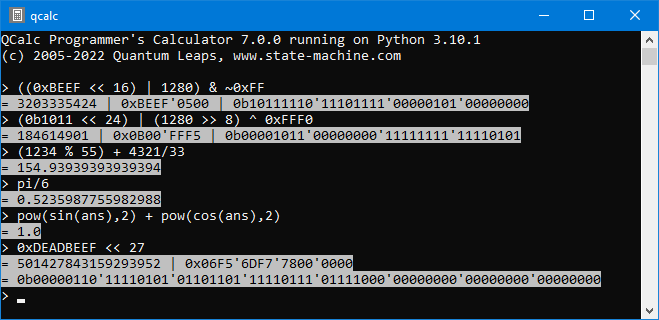qcalc programmer's calculator
Project description
"qcalc" is a powerful, cross-platform calculator specifically designed for embedded systems programmers. The calculator accepts whole expressions in the C-syntax and displays results simultaneously in decimal, hexadecimal, and binary without the need to explicitly convert the result to these bases.
General Requirements
The "qcalc" package requires Python 3, which is included in the QTools distribution for Windows and is typically included with other operating systems, such as Linux and MacOS.
Installation
The qcalc.py script can be used standalone, without any
installation (see Using "qcalc" below).
Alternatively, you can install qcalc.py with pip from PyPi by
executing the following command:
pip install qcalc
Or directly from the sources directory (e.g., /qp/qtools/qcalc):
python setup.py install --install-dir=/qp/qtools/qcalc
Using "qcalc"
If you are using qcalc as a standalone Python script, you invoke
it from a console as follows:
python /path-to-qcalc-script/qcalc.py [expression]
Alternatively, if you've installed qcalc with pip, you invoke
it from a console as follows:
qcalc [expression]
Batch mode
If you provide the optional [expression] argument, qcalc will evaluate the expression, print the result and terminate.
Interactive mode
Otherwise, if no [expression] argument is provided, qcalc will start in the interactive mode, where you can enter expressions via your keyboard.
Features
The most important feature of "qcalc" is that it accepts expressions
in the C-syntax -- with the same operands and precedence rules as
in the C or C++ source code. Among others, the expressions can contain
all bit-wise operators (<<, >>, |, &, ^, ~) as well as
mixed decimal, hexadecimal and binary constants.
"qcalc" is also a powerful floating-point scientific calculator and
supports all mathematical functions (sin(), cos(), tan(),
exp(), ln(), ...). Some examples of acceptable expressions are:
((0xBEEF << 16) | 1280) & ~0xFF-- binary operators, mixed hex and decimal numbers($1011 << 24) | (1280 >> 8) ^ 0xFFF0-- mixed @ref qcalc_bin "binary", dec and hex numbers(1234 % 55) + 4321//33-- remainder, integer division (note the//integer division operatorpi/6-- pi-constantpow(sin(ans),2) + pow(cos(ans),2)-- scientific floating-point calculations, ans-variable
NOTE "qcalc" internally uses the Python command
evalto evaluate the expressions. Please refer to the documentation of the Python math expressions for more details of supported syntax and features.
Automatic Conversion to Hexadecimal and Binary
If the result of expression evaluation is integer (as opposed to floating point),
"qcalc" automatically displays the result in hexadecimal and binary formats
(see "qcalc" screenshot above). For better readability the hex display shows
an apostrophe between the two 16-bit half-words (e.g., 0xDEAD'BEEF).
Similarly, the binary output shows an apostrophe between the four 8-bit
bytes (e.g., 0b11011110'10101101'10111110'11101111).
Hexadecimal and Binary Numbers
As the extension to the C-syntax, QCalc supports both hexadecimal numbers
and binary numbers. These numbers are represented as 0x... and0b...,
respectively, and can be mixed into expressions. Here are a few examples
of such expressions:
(0b0110011 << 14) & 0xDEADBEEF (0b0010 | 0b10000) * 123
History of Inputs
As a console application "qcalc" "remembers" the history of the recently entered expressions. You can recall and navigate the history of previously entered expressions by pressing the "Up" / "Down" keys.
The ans Variable
"qcalc" stores the result of the last computation in the ans variable.
Here are some examples of expressions with the ans variable:
1/ans-- find the inverse of the last computation@nlog(ans)/log(2)-- find log-base-2 of the last computation@n
64-bit Range
"qcalc" supports the 64-bit range and switches to 64-bit arithmetic automatically when an integer result of a computation exceeds the 32-bit range. Here are some examples of the 64-bit output:
> 0xDEADBEEF << 27 = 501427843159293952 | 0x06F5'6DF7'7800'0000 = 0b00000110'11110101'01101101'11110111'01111000'00000000'00000000'00000000 > 0xDEADBEEF << 24 = 62678480394911744 | 0x00DE'ADBE'EF00'0000 = 0b00000000'11011110'10101101'10111110'11101111'00000000'00000000'00000000 > 0xDEADBEEF << 34 ! out of range >
Error Handling
Expressions that you enter into "qcalc" might have all kinds of errors:
syntax errors, computation errors (e.g., division by zero), etc.
In all these cases, "qcalc" responds with the Error message and the
explanation of the error:
> (2*4) + )
Traceback (most recent call last):
File "C:\qp\qtools\qcalc\qcalc.py", line 54, in _main
result = eval(expr)
File "", line 1
(2*4) + )
^
SyntaxError: unmatched ')'
>
More Information
More information about "qcalc" is available online at:
More information about the QTools collection is available online at:
Project details
Download files
Download the file for your platform. If you're not sure which to choose, learn more about installing packages.
Source Distribution
Built Distribution
Filter files by name, interpreter, ABI, and platform.
If you're not sure about the file name format, learn more about wheel file names.
Copy a direct link to the current filters
File details
Details for the file qcalc-7.3.3.tar.gz.
File metadata
- Download URL: qcalc-7.3.3.tar.gz
- Upload date:
- Size: 5.9 kB
- Tags: Source
- Uploaded using Trusted Publishing? No
- Uploaded via: twine/5.0.0 CPython/3.12.1
File hashes
| Algorithm | Hash digest | |
|---|---|---|
| SHA256 |
362dcf7e434ab7cb90922a028bebf7f3ee780235cddc99c9fa462c555fe99bd3
|
|
| MD5 |
bcd35f643c4b26988bdccf72cfe2d1fd
|
|
| BLAKE2b-256 |
9e194544f9cbe50e9bd32f9dce74d8d894cd7357361d702b417d2db4973dd0e0
|
File details
Details for the file qcalc-7.3.3-py3-none-any.whl.
File metadata
- Download URL: qcalc-7.3.3-py3-none-any.whl
- Upload date:
- Size: 5.9 kB
- Tags: Python 3
- Uploaded using Trusted Publishing? No
- Uploaded via: twine/5.0.0 CPython/3.12.1
File hashes
| Algorithm | Hash digest | |
|---|---|---|
| SHA256 |
65b3246a5914e3efcc7f06aec8f7561125cfe68725ea309498607aaf15c4e280
|
|
| MD5 |
f47e4447f6b3b6f329d97900e1e8bec4
|
|
| BLAKE2b-256 |
3827dcb6e4d586a8d08123fda9e76d74d7e55c15c3fe495260f06a01d4d16326
|












